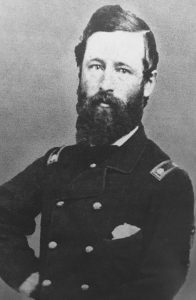Month:
January, 2018
Here’s the next in my infrequent series of profiles of forgotten cavalrymen of the American Civil War.
George S. Acker was born near Rochester, New York on December 25, 1835. In 1839, his family relocated to Kalamazoo, Michigan, where he lived the rest of his life. “He was a bright and chivalrous young man,” recalled a local resident. He worked in a Kalamazoo hotel before the outbreak of the Civil War, where he was a “popular assistant.”
With the coming of war, he decided to enlist. He helped to recruit a company of the 1st Michigan Cavalry and was commissioned a captain. While serving in the 1st Michigan Cavalry, Acker “took an active part in the contests at Winchester, Orange Court Honse, Cedar Mountain, and the second Bull Run, where, a charge that he led freed Lt. Col. Charles H. Town, who had been captured, and brought him back into the Union lines, badly wounded. He was made Major on September 2, 1862 in recognition of his gallantry.
When the 9th Michigan Cavalry was formed that fall, he was assigned as its lieutenant colonel.The 9th Michigan Cavalry was mustered into service in May 1863. The 9th Michigan, then commanded by Col. James L. David, was ordered to Covington, Kentucky, leaving by detachments, on May 18, 20, and 25, 1863, respectively. Then, on June 4, the regiment marched to Hickman’s Bridge, where on June 12, they were ordered to Mount Sterling, to pursue guerrillas, whom they overtook at Triplett’s Bridge, then completely routed.The regiment then joined the pursuit of Brig. Gen. John Hunt Morgan’s cavalry, which invaded Indiana and Ohio. Acker “was very prominent in the pursuit and capture of the notorious rebel Gen. John H. Morgan in Ohio in July and August 1863,” noted his obituary, which also said, “He said to his command, ‘Come,’ and led them wherever the enemy opposed or danger threatened.” The 9th Michigan played a significant role at the July 19, 1863 Battle of Buffington Island in southeastern Ohio. In November 1863, Acker was commissioned colonel of the 9th Michigan Cavalry.The Detroit Free Press described Acker’s role in the battle of Morristown, fought on December 10, 1863 as part of the Knoxville Campaign: “Col. Acker threw himself at the head of his regiment and shouted: “Boys, charge the rascals with a yell,’ and himnelf setting the example, with revolver in hand, charged full speed up the hill. The enemy broke ranks and ran in confusion to the rifle-pits, and when the boys saw Col. Acker standing in the rifle-pits sending its contents along the trender, it was enthusiasm run mad that sent his men like a swarm into tbe ditches. It was in vain the rebels tried to stay the storm. After the first charge was fired our boys clubbed their muskets, and thus fought their way through their fortifications.” Acker was wounded in the right leg in combat at Bean’s Station on December 14, 1863 during the Knoxville Campaign. Acker returned to duty in March 1864, in time for the beginning the Atlanta Campaign and commanded his regiment throughout that critical 1864 campaign.
He briefly commanded a brigade during the March to the Sea, and retained command of his regiment for the rest of the war, participating in the battles of the Carolinas Campaign and then in the pursuit of Gen. Joseph E. Johnston’s army to Raleigh, North Carolina. A soldier of the 92nd Illinois remembered him as “a cool and brave cavalry soldier.” He was brevetted to brigadier general of volunteers at the end of the war, and mustered out in June 1865. His obituary noted that “His services are often referred to as among the most valuable and gallant of the many excellent officers of Michigan regiments.”
After the Civil War, he led a quiet life, working as a hotelkeeper and milkman. Acker died on September 6, 1879 at the young age of 44. He apparently never married, as his obituary indicates that he was survived by his mother and sister. He was buried in Riverside Cemetery in Union City, Michigan.
Here’s to Bvt. Brig. Gen. George S. Acker, forgotten cavalryman, who did his duty well and honorably throughout the Civil War.
Scridb filter









 Back to top
Back to top Blogs I like
Blogs I like 